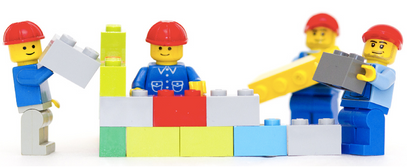LEGO®-based Therapy

It was originally developed by Dr. Dan LeGoff, a Paediatric Neuropsychologist in the USA. He noticed that otherwise uncommunicative children came together and started to talk when LEGO® bricks were around.
Young people work together to build LEGO® models and through this have the opportunity to develop social skills such as turn taking, collaboration and social communication.
LEGO®-based therapy is used at Daventry Hill School both individually and in groups. Natural opportunities for developing social competence are facilitated by the therapist.
Key to this approach is how engaging and enjoyable it is for the participants! Building LEGO® collaboratively is great fun, and young people develop social skills while enjoying themselves.
LEGO®-based therapy sessions are flexible. The main aim is to encourage children to collaborate with each other. This means the type of activity you engage in is less important than the adult facilitating the collaborative play between young people.
Initially, children can be assigned different roles to build a kit following the instructions. Whilst everyone can see the picture, each child has a different job to do:-
- The Engineer: describes the instructions
- The Supplier: find the pieces
- The Builder: puts the pieces together
Students have to talk to each other and interact to get the model built. Students take it in turns to perform the different roles, so everyone gets a turn within the model.
Moving on, students can design and build their own creations together (freestyle building), make stop-action movies, make stories and so on.
